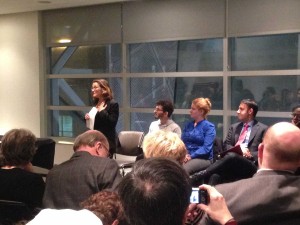Preparations underway to settle Syrian refugees

Chrystia Freeland (MP, University-Rosedale) addresses a packed town hall on refugees at the Miles Nadal Jewish Community Centre on Dec. 23. Many local groups are privately sponsoring Syrian refugees, who are expected to start settling in the Annex in the coming months. Courtesy Benjamin Bergen
By Summer Reid and Annemarie Brissenden
As waves of Syrian refugees continue to arrive at Toronto Pearson International Airport to great fanfare, grassroots organizations from the Annex are anxiously waiting to welcome the families they have sponsored as they continue to raise money and prepare for the new arrivals.
“The enthusiasm and the contributions have been pretty overwhelming,” said Emily Gilbert, a member of Palmerston Welcomes Refugees (PWR), a group of neighbours who united to sponsor a Syrian family.
The Palmerston neighbours have already exceeded their goal to sponsor one family and are well on their way to raising enough money to sponsor a second from Syria.
Students at Palmerston Avenue Junior Public School were part of the team and made cards, collected coins, and hosted bake and T-shirt sales, all to raise money for the cause.
Over $75,500 of their initial goal of $92,800 has been raised, reported fellow group member Monica Gupta, and PWR expects the first family to arrive some time in the coming weeks.
Another local group, the Major Street Refugee Initiative, is close to reaching its goal of $50,000, and will host additional fundraising events this month to close the gap.
The preparations aren’t solely limited to fundraising, however.
LoveArabic, an organization based out of the Centre for Social Innovation’s Bathurst Street location, has come up with a novel idea to help ease the communication barrier between Canadian and Syrian families: a video blog to be launched in February that will teach followers Arabic phrases in the Syrian dialect.
“Rania and I discussed the idea together and we knew it would be something we could do well,” explained LoveArabic’s Waleed Nassar, who co-founded the organization with his wife Rania Zaki.
The couple and their two children moved to Canada from Egypt in 2012, and Zaki — a teacher in the Toronto District School Board — has organized Arabic language and culture classes since 2014.
Nassar added that “it would also be a way to thank all of the Canadian families who are involved in privately sponsoring refugee families.”
Private sponsorship is uniquely Canadian.
“We are the only country in the world that has private sponsorship,” said Alexandra Kotyk, project manager for Lifeline Syria, at a December town hall on refugees organized by Chrystia Freeland (MP, University-Rosedale). The program dates to 1979, when Canadians privately sponsored 35,000 refugees from Vietnam, Cambodia, and Laos. “This is the best thing that private Canadians can do again.”
The town hall was an opportunity for community groups to share resources, get guidance from settlement experts like Kotyk and Huda Bukhari, the executive director of the Arab Community Centre of Toronto, and hear from Mohammed Aboura, who recently arrived from Syria courtesy of private sponsorship.
“It’s not easy to start your life over from scratch,” related Aboura, who loves poutine, sings “Oh Canada” in English and French, and canvassed for Freeland during the last election.
Some of the biggest challenges facing refugees include finding housing for large families, resuming one’s education without transcripts and similar records, recovering from trauma, and finding the appropriate medical care.
It’s also important, agreed Kotyk, Bukhari, and Aboura, to give families the space to make their own decisions.
Bukhari explained that “sponsorship expectations are not always the same as expectations from families themselves. Sometimes sponsors get offended if families give away donated furniture to buy their very own, for example.”
It is all part of the natural process of moving on, stressed Kotyk, urging sponsors to reach out to organizations like hers if there are settlement issues.
“Syrians are a very proud people,” noted Aboura. “We thank you for your help, but want to get back on our feet as soon as possible.”
Some sponsors spoke about at-risk refugees from other countries, particularly Iraq, whose applications haven’t yet been processed, and asked whether the delay is because they are “Iraqi, not Syrian”.
The Syrian settlement program is “not intended to give the impression that it’s causing delay for other streams,” responded Arif Virani (MP, Parkdale-High Park), Parliamentary Secretary for Immigration.
He added that Syrian refugees are being settled in Canada in addition to those streams that were already, and continue to be, in process, undertaking to review the files of those who were at the meeting.
It was a reminder that Syrians are not the only group of people who need support.
“There are issues that we need to address at home,” said PWR’s Gilbert. “It would be great to see some of this enthusiasm around the issues to do with First Nations, for example.”
